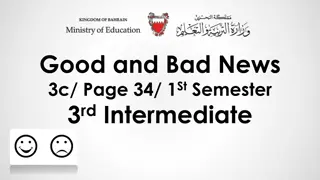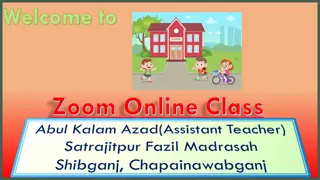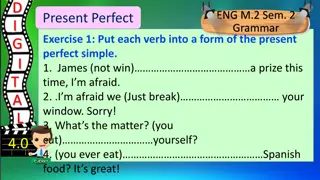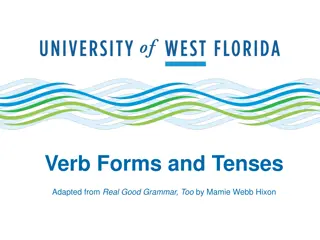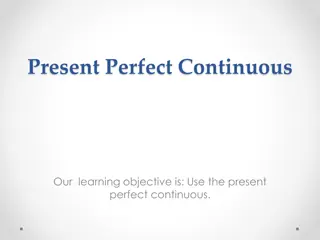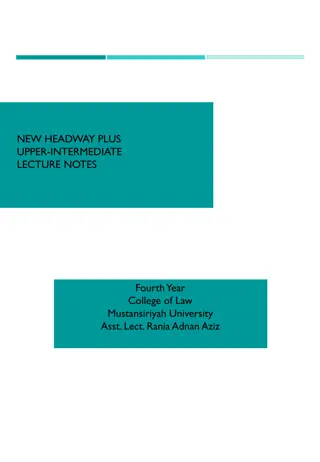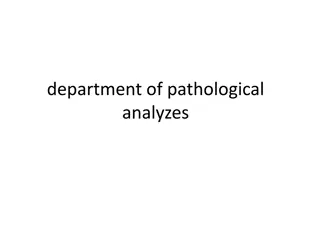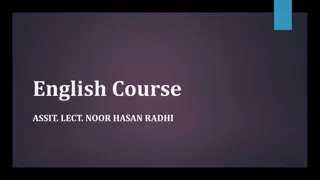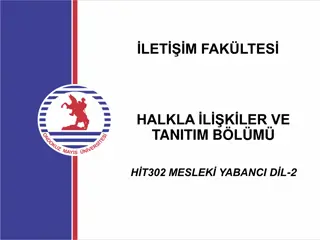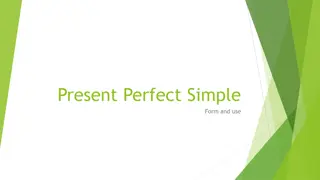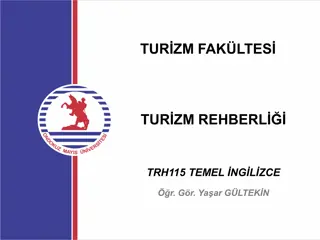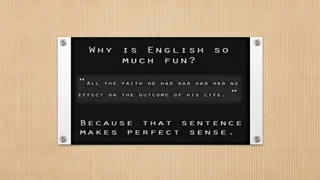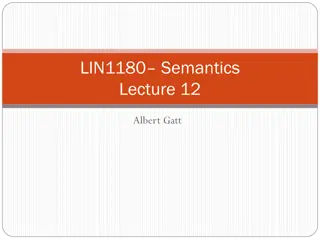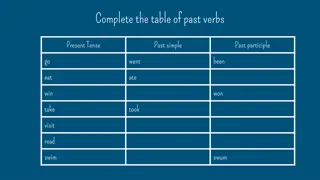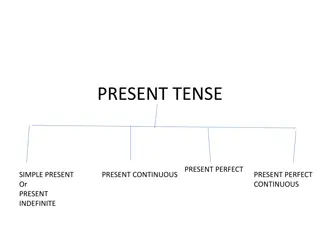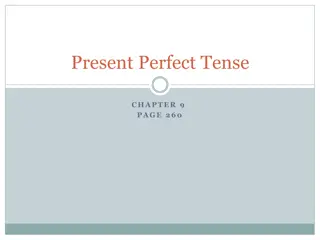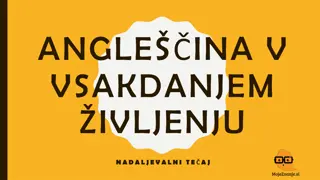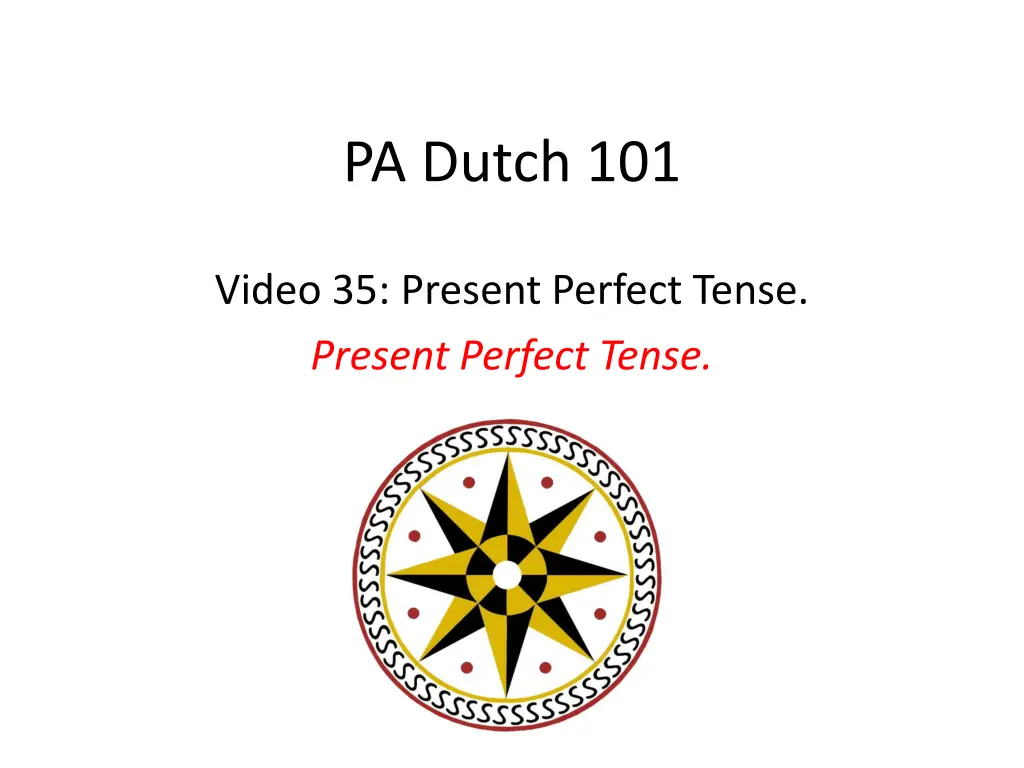
Mastering the Present Perfect Tense in Pennsylvania Dutch
Learn how to form and use the Present Perfect Tense in Pennsylvania Dutch (PD), including the role of auxiliary verbs, past participles, and rules for regular and irregular verbs. Find out the word order and specific examples for context. Enhance your language skills with this comprehensive guide!
Download Presentation

Please find below an Image/Link to download the presentation.
The content on the website is provided AS IS for your information and personal use only. It may not be sold, licensed, or shared on other websites without obtaining consent from the author. If you encounter any issues during the download, it is possible that the publisher has removed the file from their server.
You are allowed to download the files provided on this website for personal or commercial use, subject to the condition that they are used lawfully. All files are the property of their respective owners.
The content on the website is provided AS IS for your information and personal use only. It may not be sold, licensed, or shared on other websites without obtaining consent from the author.
E N D
Presentation Transcript
PA Dutch 101 Video 35: Present Perfect Tense. Present Perfect Tense.
Present Perfect Tense The Present Perfect Tense is used in PD to express the Past Tense. It is formed with an auxiliary verb and the past participle. The two auxiliary verbs in PD are hawwe and sei. Sei is only used in situations where there is a change of position or condition.
Present Perfect Tense The word order for a past tense sentence in PD uses these equations: subject hawwe/sei other stuff past participle. hawwe/sei subject other stuff past participle? Ich hab Deitsch gelannt. I learned Dutch. Er iss nooch Kanadaa gfaahre. He drove to Canada.
The Past Participle: Regular Verbs The Past Participle is formed by: Dropping the E Adding GE to the front of the stem. Adding T to the end of the stem. GE + STEM + T mache = gemacht
The Past Participle: Irregular Verbs The Past Participle is formed by: Dropping the E Adding GE to the front of the stem. Adding E to the end of the stem. GE + STEM + E lese = gelese In most Irr. Verbs, the stem changes spelling! laafe = geloffe These must be memorized or looked up in a dictionary!
Rules to form Past Participles Reg. Verbs ending in a consonant + LE, drop the E and add an E before the L, then add T: rechle = gerechelt (calculate) Reg. Verbs whose stem end in D, change the D to T: deide = gedeit (point) Reg. Verbs whose stems end in DD, change the DD to TT: andwadde = geandwatt (answer)
Rules to form Past Participles Verbs that begin with the letters H,F and S only take a G instead of GE: heesse = gheese (call) GH = K sound sitze = gsotze (sit) schwetze = gschwetzt (talk) The prefix GE is dropped altogether before some stems beginning with G: gewwe = gewwe geh = gange
Rules to form Past Participles No GE is added to a verb with an inseparable prefix: verschteh = verschtanne bezaahle = bezaahlt If a verb has a separable prefix, the prefix is attached to the front of the past participle: uffschteh = uffgschtanne rumlaafe = rumgeloffe
Present Perfect Tense When building sentences in the Present Perfect Tense, it is vital that you are able to form the Past Participle. A dictionary will help you! All dictionaries will give the Past Participle with each verb. to go geh, gange (pp)
Sei As has been the case before, SEI has its own separate past tense. You can use: iss + gewese, but most PD use the following form: ich du er/sie/es waar waarscht waar mir dihr sie waare waart waare
Present Perfect Tense Die Susan froogt ihr Daadi. Die Susan hot ihr Daadi gfroogt. Der Chris schpielt sei Gitar. Der Chris hot sei Gitar gschpielt. Der Mann un sei Fraa faahre nooch Reading. Der Mann un sei Fraa sin nooch Reading gfaahre.
Iewing Practice Ich helf meinre Mudder in der Kich. Ich hab meinre Mudder in der Kich gholfe. Der Onkel kummt am Freidaag. Der Onkel iss am Freidaag kumme. Die Kinner drinke viel Lemonade. Die Kinner hen viel Lemonade gedrunke.
Bis die naegschde Video, Macht s gut un schwetzt Deitsch! E-Poscht schreiwe: busterpa@yahoo.com

